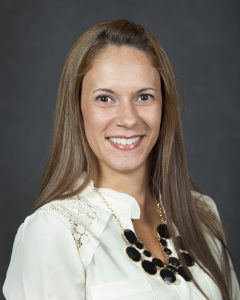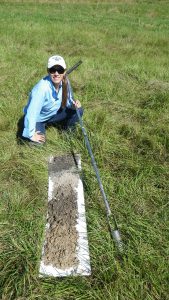To celebrate National Women’s History Month, we sat down with Maria Silveira, a professor of soil and water sciences at the UF/IFAS Range Cattle Research and Education Center. Born and raised 90 minutes from Sao Paulo, Brazil, Silveira went to college knowing little about agriculture. But she soon learned that soil provides life itself.
Q: When did you first get the spark to study soils and why?
A: Soil is where life starts. My love/obsession for soil started while pursuing my undergraduate degree, when I learned the multiple functions that soil provides to society as a whole. Soils are the backbone of food production, and I was fascinated to learn that soils could be managed to increase food production. Later during my graduate studies, I also learned that soils play a vital role in protecting the environment.

Q: Please tell us a little about your childhood.
A: I was the youngest of three children. My mom, dad and brother were all lawyers. My sister is a medical doctor. My family, especially my mom, didn’t easily accept my decision to pursue a degree in agriculture. Although my family owned a small, recreational ranch, I didn’t feel that I had a strong background in agriculture. To overcome that, during my undergraduate days, I tried as many internship and hands-on learning opportunities as I could. Every summer/winter break or on weekends, I can remember from my college years, I was either working as intern at a commercial farm or ranch or participating in hands-on training at my university. I am happy that my parents not only accepted my decision but also supported me in my journey.
Q: Speaking of college, where did you go for your undergraduate and graduate degrees?
A: I started college when I was 17. I decided to pursue an undergraduate degree in agriculture at the University of Sao Paulo. After completing my bachelor’s degree, I was so fascinated by agriculture, in particular soil management, I decided to pursue a master’s in soil science at the same university. After completing my master’s, my curiosity for science only continued to grow. During my Ph.D. studies (also in soil science) I studied and conducted my research at the University of California-Riverside. While I was there, I decided to pursue a career in academia in an American institution. My experience there also was a huge turning point for me: I knew what I wanted to do for the rest of my life — be a scientist.
Q: When and why did you start at UF/IFAS? Did you start at the Range Cattle REC?
A: After I completed my Ph.D. program, I was hired by UF/IFAS as a postdoctoral associate in 2003. I worked as a postdoc in Gainesville until 2005 and then moved to Texas A&M University. I was hired as an assistant professor at the Range Cattle REC in 2006. UF/IFAS’ reputation as a top research institution in the United States made my decision pretty easy. I knew UF/IFAS was the place where I wanted to pursue my dream of being a soil scientist. The resources and opportunities I found here do not exist anywhere else. I am happy with the decision I made 16 years ago and would not trade it for anything.
Q: How do your research and Extension programs help the cattle industry?
A: My research and Extension programs are complementary. The fact that my research has direct impacts on how ranchers manage their land motivates me further. The strong partnership with the beef cattle industry also motivates my students. They know that the impact of our research efforts extends beyond the scientific community. To me, knowing that someone can benefit from my research is one the greatest enjoyment of my work.

Q: How does your work help society in general?
A: I see my role as being a steward of this precious resource we know as soil. My research is mainly focused on improving the many important functions soil supports, such as climate regulation, water conservation, food production and carbon sequestration.
Q: What accomplishment are most proud of, personally or professionally and why?
A: Although I am very passionate about my work, the accomplishment I am most proud of are my twin daughters. From a professional standpoint, I am proud of my students’ accomplishments. A number of my former students are currently working in academia in highly reputable institutions in the United States and internationally. Knowing that I was able to contribute to their professional development is very gratifying to me.
Q: Do you feel any sense of obligation and/or opportunities as a woman in science? If so, what is/are it/they and why?
A: Yes, I feel a sense of obligation for being a role model and inspiring young women to become involved in soil science. My profession is still a male-dominated field, but I hope this trend will change in the future. The more we educate the young generation that there are many opportunities for women to be involved in science, even in traditionally male-dominated fields, the better the society will be. One of my main goals as a female scientist engaged in many activities in my profession is to raise awareness and increase representation of women in soil science. Female faculty represent a significant proportion of my department’s faculty, and I am very proud of that.
-30-
The mission of the University of Florida Institute of Food and Agricultural Sciences (UF/IFAS) is to develop knowledge relevant to agricultural, human and natural resources and to make that knowledge available to sustain and enhance the quality of human life. With more than a dozen research facilities, 67 county Extension offices, and award-winning students and faculty in the UF College of Agricultural and Life Sciences, UF/IFAS brings science-based solutions to the state’s agricultural and natural resources industries, and all Florida residents.
ifas.ufl.edu | @UF_IFAS
 0
0
